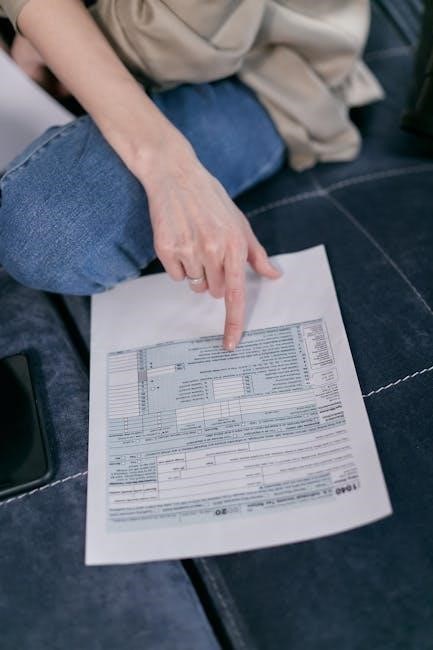al cpt instructions
Category : Instructions
The Alabama Business Privilege Tax Return (Form CPT) is an annual filing requirement for C-corporations and specific entities. It combines tax reporting with annual compliance obligations, ensuring proper state registration and legal operation. Recent legislative updates, such as the exemption for taxes due of $100 or less, simplify filing for eligible businesses. This guide provides essential instructions and insights for accurate and timely submissions.
1.1 Overview of the Alabama Business Privilege Tax
The Alabama Business Privilege Tax is an annual requirement for entities operating in the state. It applies to C-corporations, financial institutions, insurance companies, REITs, and business trusts. The tax ensures legal operation and compliance. Recent updates, such as the $100 or less exemption, simplify filing for eligible businesses. This tax is separate from the annual report but often filed concurrently using Form CPT or PPT.
1.2 Purpose of Form CPT
Form CPT is used to report and pay the Alabama Business Privilege Tax. It is mandatory for C-corporations, financial institutions, insurance companies, REITs, and business trusts. The form calculates tax liability based on net worth and ensures compliance with state regulations. It also serves as an annual report for these entities, combining tax filing with business registration requirements. Accurate submission is essential for maintaining legal business status in Alabama.
Eligibility and Requirements for Filing AL CPT
C-corporations, financial institution groups, insurance companies, REITs, and business trusts must file Form CPT. Entities with $100 or less tax due are exempt from filing.
2.1 Entities Required to File Form CPT
C-corporations, financial institution groups, insurance companies, REITs, and business trusts are required to file Form CPT. Entities with $100 or less in tax due are exempt. This ensures compliance and proper state registration for legal operation. Limited liability entities taxed as pass-throughs file the PPT form instead of CPT.
2.2 Minimum Tax Exemptions and Thresholds
The Alabama Business Privilege Tax provides exemptions for entities with $100 or less in tax due. Recent legislative changes, such as Act 2022-252, have introduced this threshold to simplify compliance. Additionally, Alabama House Bill 391 reduced the minimum tax to $50 for certain businesses starting in 2024, offering relief to smaller entities while ensuring fair tax administration across all eligible filers.
Filing Process and Required Attachments
Entities must submit specific documents with Form CPT, including federal tax forms (pages 1-6 of Form 1120) and additional schedules for insurance companies. Ensure accuracy and compliance.
3.1 Necessary Documents for Form CPT Submission
Entities filing Form CPT must attach federal tax documents, including pages 1-6 of Form 1120. Insurance companies require additional schedules and statements. Ensure all documents are complete and accurate to avoid delays. Submission can be made online or by mail, with deadlines varying by entity type. Proper documentation ensures compliance with Alabama’s tax regulations and avoids penalties.
3.2 Step-by-Step Filing Guidelines
Start by calculating tax liability using Form CPT instructions. Gather required documents, including federal tax returns and schedules. Complete the form accurately, ensuring all fields are filled. Attach necessary supporting documents as specified. Review the form for errors before submission. Submit electronically or by mail, adhering to deadlines. Ensure timely filing to avoid penalties and maintain compliance with Alabama tax regulations. Professional assistance is recommended for complex cases.
Annual Report and Compliance
The Alabama Business Privilege Tax Return combines annual reporting with tax compliance, ensuring entities remain legally operational. Failing to comply results in penalties and affects business standing.
4.1 Combining Annual Report with Tax Filing
Alabama Form CPT streamlines compliance by combining the Business Privilege Tax Return with the annual report. This single filing process ensures entities meet both tax and regulatory obligations efficiently. Required attachments include federal tax forms and specific schedules, depending on the entity type. Recent legislative changes, such as the $100 tax exemption, simplify filing for eligible businesses while maintaining compliance standards to avoid penalties and maintain good standing.
4.2 Importance of Compliance and Consequences of Late Filing
Compliance with Alabama Business Privilege Tax filing is crucial to maintain legal standing. Late filing results in a minimum $50 late fee, with additional penalties based on tax owed. Failure to file or pay timely can lead to loss of good standing, affecting business credibility and potentially causing financial repercussions. Ensuring timely submissions is essential to avoid penalties and maintain operational integrity in Alabama.
Key Deadlines and Due Dates
The Alabama Business Privilege Tax Return (Form CPT) must be filed by March 15 for C-corporations and by April 15 for LLPs, LPs, and LLCs annually. Recent legislative changes, such as the 2024 exemption for taxes due of $100 or less, simplify filing requirements for eligible businesses, ensuring compliance with updated state regulations effectively.
5.1 Tax Filing Deadlines for Different Entities
C-corporations must file Form CPT by March 15 annually, while LLPs, LPs, and LLCs have an April 15 deadline. Entities with $100 or less in tax liability are exempt from filing. Recent changes, effective January 1, 2024, no longer require filing the annual report with the Secretary of State, streamlining the process for businesses in Alabama.
5.2 Extensions and Penalties for Late Submission
Failure to file Form CPT by the deadline results in a minimum late fee of $50, with additional penalties based on tax owed. Late submission can lead to loss of good standing, impacting business credibility and financial operations. The Alabama Department of Revenue encourages timely filing to avoid penalties and maintain compliance. Extensions may be requested under specific circumstances, but penalties still apply to unpaid taxes.

Tax Calculations and Payments
The Alabama Business Privilege Tax is calculated based on net worth or income, with a minimum tax of $100. Taxpayers with $100 or less due are exempt. Payments are submitted with Form CPT or PPT, depending on entity type, ensuring compliance with state regulations.
6.1 Determining Privilege Tax Liability
Privilege tax liability is determined based on the entity’s net worth or income. For corporations, it’s calculated using federal taxable income. The minimum tax is $100, but if the calculated tax is $100 or less, no payment is required. Entities must submit financial statements and federal returns to accurately determine their liability, ensuring compliance with Alabama’s tax regulations and avoiding penalties.
6.2 Payment Methods and Options
Payment for the Alabama Business Privilege Tax can be made online through the Alabama Department of Revenue’s MyAlabamaTaxes portal or by mailing a check with Form CPT. Electronic funds transfer is also accepted for timely payments. Late payments incur penalties, with a minimum $50 late fee. Ensure payments are made by the deadline to avoid additional charges and maintain compliance with state tax regulations.

Special Considerations and Exemptions
Certain entities may qualify for exemptions under the Alabama Business Privilege Tax. Taxpayers with a liability of $100 or less are exempt from filing Form CPT. Limited partnerships are not required to file a privilege tax but must submit an annual notice. Non-profit charities pay a reduced annual renewal fee of $25 to the Attorney General. These exemptions simplify compliance for eligible businesses.
7.1 Industry-Specific Requirements
Insurance companies must attach Schedule T and the Annual Statement of Liabilities, Surplus, and Other Funds to Form CPT. Financial institutions and REITs have unique reporting requirements. Recent legislative changes, such as Act 2022-252, introduce exemptions for certain industries. Entities must review industry-specific guidelines to ensure compliance with Alabama’s Business Privilege Tax regulations and submit all required documentation to avoid penalties.
7.2 Recent Legislative Changes Affecting CPT Filings
Recent legislation, such as Act 2022-252, introduced a full exemption for businesses with tax due of $100 or less. Additionally, Alabama House Bill 391 reduced the minimum business privilege tax from $100 to $50 for taxable years starting in 2024. These changes simplify compliance for small entities and reduce administrative burdens. Staying informed about such updates is crucial for accurate and timely CPT submissions.

Resources and Support
The Alabama Department of Revenue offers official guidelines and forms for CPT filings. Professional tax advisors can provide tailored assistance for complex scenarios and compliance.
8.1 Official Alabama Department of Revenue Guidelines
The Alabama Department of Revenue provides comprehensive instructions and downloadable forms for Form CPT. Their official website offers detailed guides, including filing procedures and required attachments. Taxpayers can access resources such as form CPT, schedules, and annual report requirements. The department also outlines eligibility criteria and exemptions, ensuring clarity for entities subject to the Business Privilege Tax.
8.2 Professional Assistance and Legal Advice
For complex filings, consulting a tax professional or attorney is advisable. Platforms like UpCounsel offer access to experienced lawyers, ensuring compliance with Alabama’s Business Privilege Tax requirements. Legal experts can navigate intricate tax calculations, exemptions, and annual reporting, reducing errors and potential penalties. Their expertise is crucial for entities with unique circumstances or industry-specific obligations, ensuring accurate and timely submissions.

Common Mistakes to Avoid
Common errors include missing deadlines, incorrect tax calculations, and improper attachments. Ensure all required documents, like federal tax pages, are included to avoid penalties and delays.
9.1 Frequently Encountered Errors in CPT Filings
Common mistakes include incorrect tax liability calculations, missing required federal tax pages, and failure to attach necessary documents like Schedule T for insurance companies. Additionally, some filers overlook the $100 tax exemption threshold, leading to unnecessary submissions. Ensuring all attachments are complete and calculations are accurate prevents delays and penalties, ensuring compliance with Alabama’s requirements.
9.2 Best Practices for Accurate Submission
To ensure accurate CPT submissions, thoroughly review all calculations and required attachments, such as federal tax pages and Schedule T for insurance companies. Double-check exemptions, like the $100 tax threshold, to avoid unnecessary filings. Stay updated on legislative changes, use official Alabama Department of Revenue resources, and verify deadlines to maintain compliance and prevent penalties.
Accurate CPT submissions ensure compliance and avoid penalties. Stay informed about updates, review calculations, and consult official resources or professionals for complex cases. Timely filing is crucial.
10.1 Summary of Key Points
Alabama Form CPT is required for C-corporations and specific entities to report privilege tax and ensure compliance. Recent updates, including a $100 tax exemption, simplify filing for eligible businesses. Attachments like federal tax pages and annual statements are mandatory. Compliance with deadlines and accurate submissions are crucial to avoid penalties. Staying informed about legislative changes, such as reduced minimum taxes, helps ensure proper filing and maintaining good standing in Alabama.
10.2 Staying Informed About Updates and Changes
Regularly check the Alabama Department of Revenue website for updates on CPT filing requirements and legislative changes. Subscribe to official newsletters and alerts to stay informed about new exemptions, deadlines, or form modifications. Understanding recent updates, such as the $100 tax exemption and annual report changes, ensures compliance and avoids penalties. Proactive monitoring of state tax policies helps maintain accuracy and timeliness in CPT submissions.
